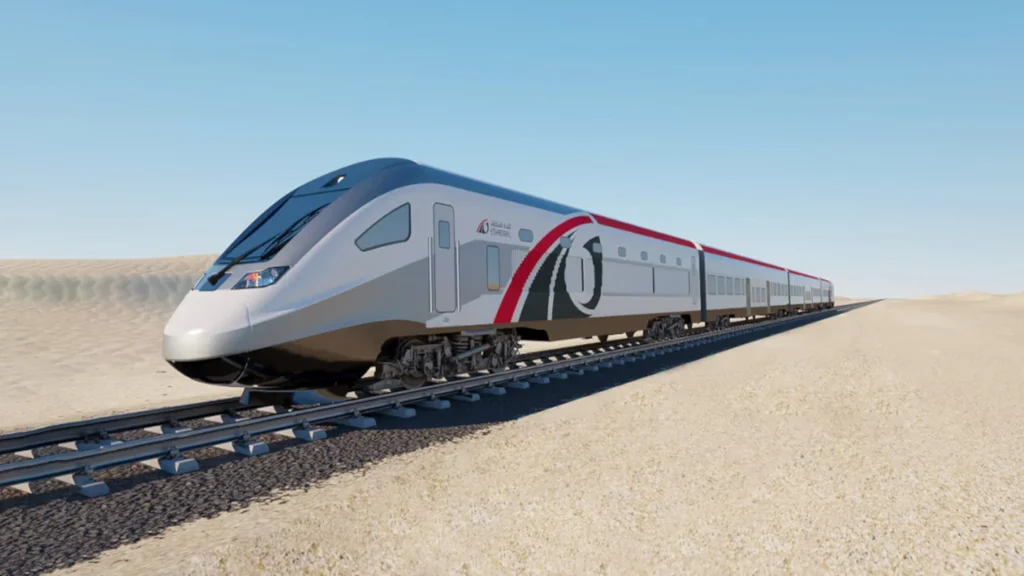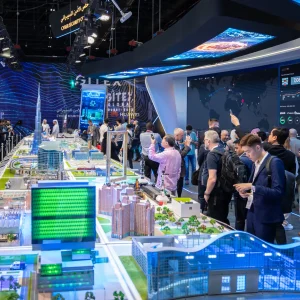Dubai and Abu Dhabi, two of the most vibrant and rapidly developing cities in the UAE, are set to be connected by a groundbreaking high-speed rail link that promises to transform inter-city travel. Etihad Rail, the country’s national rail network operator, recently announced the ambitious project, which will reduce the travel time between the two bustling hubs to just 30 minutes, a significant improvement from the current commute of up to 90 minutes by car. This initiative underscores the UAE’s commitment to innovation and sustainability in infrastructure development while enhancing connectivity, economic growth, and the quality of life for its residents.
This announcement marks a historic milestone in the UAE’s transportation landscape, with the high-speed rail expected to become a key pillar of the nation’s public transit system, boosting tourism, business, and commuter convenience.
Dubai Leap Forward for UAE’s Transport Infrastructure
The UAE has always been known for its visionary infrastructure projects, and the high-speed rail project is no exception. Spanning approximately 140 kilometers, the rail line will feature state-of-the-art technology and trains capable of reaching speeds of up to 300 km/h. This will make it one of the fastest rail links in the region, bringing Dubai and Abu Dhabi closer than ever before.

Given the increasing traffic congestion on Sheikh Zayed Road and other major highways connecting the two emirates, this new transportation alternative is expected to be a game-changer. Commuters who frequently travel between Dubai and Abu Dhabi for work, business meetings, or leisure can now look forward to a faster, smoother, and more efficient journey.
State-of-the-Art Features and Passenger Amenities

Etihad Rail has revealed that the high-speed train will incorporate world-class features designed to ensure passenger comfort, safety, and convenience. Key highlights include:
- High-Speed Trains: Capable of traveling at speeds of up to 300 km/h, significantly reducing travel times.
- Luxury Passenger Cabins: The trains will offer a range of seating options, including standard, business, and premium classes, providing travelers with a comfortable and luxurious journey.
- Smart Stations: Modern rail stations will be developed in Dubai and Abu Dhabi, complete with advanced ticketing systems, retail outlets, food courts, and passenger lounges.
- Digital Ticketing and Mobile App: A user-friendly digital ticketing system will allow passengers to easily book, manage, and track their journeys through a dedicated mobile app.
- Sustainability Focus: The project aligns with the UAE’s green initiatives, using energy-efficient technologies to reduce carbon emissions and minimize environmental impact.
Economic and Social Impact
The introduction of a high-speed rail link between Dubai and Abu Dhabi is expected to have far-reaching economic and social implications. By reducing travel times, the rail will promote stronger business ties between the two cities, encouraging trade and investment. Companies with operations in both locations will benefit from easier employee mobility and reduced travel expenses.
The rail link is also poised to transform the tourism landscape. With Dubai and Abu Dhabi being home to some of the world’s top attractions, tourists will now be able to explore both cities conveniently and efficiently. This is expected to boost the number of tourists and contribute to the UAE’s vision of becoming a global tourism hub.
Moreover, the high-speed rail will improve the quality of life for residents by reducing the time spent commuting, allowing them to spend more time with family or engage in leisure activities. The reduction in road traffic is anticipated to lower pollution levels and create a cleaner, healthier environment.
Boosting Real Estate and Job Creation
The high-speed rail project is not only about transportation; it also has the potential to influence the real estate market in both cities. Improved connectivity is expected to increase demand for residential and commercial properties near the rail stations, driving up property values and spurring new developments.
Furthermore, the construction and operation of the rail link are expected to generate thousands of jobs across various sectors, including engineering, construction, technology, and customer service. This job creation will provide a significant boost to the UAE’s economy and contribute to its long-term growth.
Challenges and Solutions
While the high-speed rail project presents numerous benefits, it also comes with challenges that must be addressed. One major concern is the cost of construction and maintenance. Building a high-speed rail network involves significant financial investment, which could strain budgets if not managed efficiently.
To overcome this challenge, Etihad Rail has been exploring partnerships with international investors and infrastructure development companies. Additionally, the government’s commitment to the project and its alignment with the UAE’s long-term development goals provide confidence in its successful execution.
Another challenge is ensuring a seamless integration with existing public transport networks. Etihad Rail plans to work closely with local transport authorities to develop last-mile connectivity solutions, such as shuttle services, taxi stands, and ride-sharing options at rail stations.
Government Support and Vision 2030 Alignment
The high-speed rail project is a vital component of the UAE’s Vision 2030, which aims to diversify the economy, reduce dependence on oil, and enhance the quality of life for residents. The government has been a strong advocate for innovative infrastructure projects that contribute to sustainable urban development and economic growth.
By investing in a modern, efficient rail network, the UAE is positioning itself as a regional leader in transportation innovation. The high-speed rail link between Dubai and Abu Dhabi will not only serve as a symbol of progress but also as a practical solution to the growing transportation needs of a rapidly expanding population.
A Game-Changer for UAE’s Future
The launch of the high-speed train between Dubai and Abu Dhabi marks a new era for transportation in the UAE. It promises to deliver a host of benefits, from reduced travel times and improved passenger experiences to economic growth and environmental sustainability.
As the project moves forward, residents and businesses alike can look forward to a future where Dubai and Abu Dhabi are seamlessly connected, fostering a more dynamic and interconnected UAE. The high-speed rail is more than just a transportation initiative—it’s a bold step toward building a smarter, more sustainable future for the nation.
Do follow Uae stories for more Updates
Saif Ali Khan’s Attacker Remains at Large: Investigation Underway












